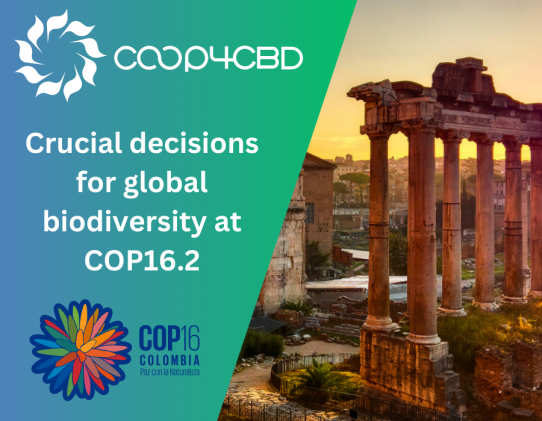
Credit: Pensoft Publishers
UN CBD COP16’s resumption in Rome concludes with crucial decisions on biodiversity financing and monitoring
Between 25 and 27 February, biodiversity policymakers, researchers, and activists came together at the headquarters of the Food and Agriculture Organisation (FAO) in Rome for the continuation of the UN CBD’s 16th Conference of Parties (COP16.2). With several key issues left on the table after proceedings were suspended in Colombia last year, delegates had important discussions and negotiations to look forward to during those three days.
The summit’s conclusion came with several key agreements that promise to help pave the way towards realising the promises encoded in the UN CBD and KM-GBF. The highlights of note are:
-
The launch of the Cali Fund
With this special initiative successfully agreed upon by the Parties, the Cali fund was launched at the very beginning of the conference. This new fund will provide a mechanism by which businesses benefiting from digital sequence information (DSI) on genetic resources will be mobilised for biodiversity conservation and restoration efforts worldwide. The fund will thus ensure that commercial use of DSI resources will go hand in hand with a more efficient and equitable utilisation of these resources.
-
Resource mobilisation strategy
Another milestone was the approval of a permanent monetary mechanism accompanying the UN CBD in a bid to close the financial gap worsening the biodiversity decline. This will take the form of a comprehensive research mobilisation strategy that incorporates numerous financial frameworks and objectives. The core guiding principle of the roadmap will be to “identify and implement measures to enhance the global biodiversity finance to mobilise new and additional resources from all sources”. This is complemented by a crucial commitment by the Parties to collect at least 200 billion dollars for this purpose every year in the run-up to 2030.
-
Planning, Monitoring, Reporting, and Review (PMRR) Mechanism
The planning, monitoring, reporting and review mechanism of the KM-GBF establishes mechanisms to review its implementation progress at future conferences. The PMRR mechanism will rely not only on contributions by national governments but also by youth, women, indigenous peoples, local communities, civil society and the private sector, thus ensuring a comprehensive approach to biodiversity conservation.
The successful conclusion of COP16.2 in Rome underscores the international community's commitment to advancing biodiversity conservation through collaborative efforts, strategic financial planning, and inclusive participation of diverse stakeholders. This sentiment was underscored in Italy by Susana Muhammad, former Columbian Minister of Environment and Sustainable Development and outgoing President of the COP16 summit. At the conference’s conclusion, she asserted: “I announce officially that we have given legs, arms and muscle to the Kunming-Montreal Biodiversity Framework. We appreciate the willingness of all countries and the Secretariat of the Convention for their dedication to continue strengthening the global biodiversity agenda”.
You can read more on the proceedings in Rome here. To find out more about CO-OP4CBD’s contributions at the world’s largest biodiversity conference, visit this page.